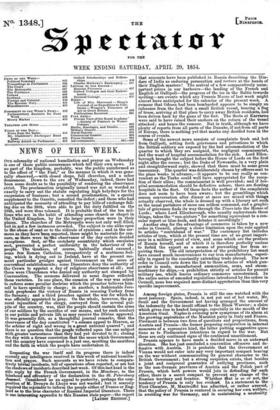Respecting . the war itself and its progress there is indeed
seemly any intelligence received in this week of national humilia- tion and prayer. Such accounts as we have relate to compara- tively trivial incidents, tell of operations often reported, or are but the shadows of incidents described last week. Of this last kind is the able reply by the French Government, in the Moniteur, to the falsehood and effrontery of the declaration in the St. Petersburg .i8unsal. Considered as an appeal to posterity, perhaps the com- position of M. Drouyn de Lhuys was not wasted ; but it scarcely required the rejoinder to inform the people either of France or Eng- land as to the true character of Russian Imperial literature. There is one interesting appendix to this Russian state paper—the report that accounts have been published in Russia describing the Ilin- does of India as enduring persecution and torture at the hands of their English masters! The arrival of a few comparatively unim- portant prizes in our harbours—the landing of the French and English at Gallipoli—the progress of the ice in the Baltic towards melting—are events which any Francis Moore of last week might almost have anticipated for the calendar of the present week. A. rumour that Odessa had been bombarded appears to be simply an inference from the fact that a small British vessel, bearing a flag of truce, arriving at that place to carry away British residents, had been driven back by the guns of the fort. The fleets at Karvarna were said to have raised their anchors on the return of the vessel attacked; and hence the rumour. But in truth, although we have plenty of reports from all parts of the Danube, if not from all parts of Europe, there is nothing yet that marks any decided turn in the course of events.
Some of the newest news consists of complaints fresh and hot from Gallipoli, setting forth grievances and privations to which the British soldiery are exposed by the bad accommodation of the quarter to which they are assigned, the negligent commissariat, and the want of hospital accommodation for the sick. Lord Ellen- borough brought the subject before the House of Lords on the first night after the recess ; but the Duke of Newcastle, in a very plain and straightforward reply, showed that there must be some gross inaccuracy. The quarter was deliberately chosen by officers sent to the place weeks in advance,—it appears to be one really as con- venient as the Turks could well have appropriated for the recep- tion of their allies ; the commissariat is well provided; and if hos- pital accommodation should be defective ashore, there are floating hospitals in the fleet. Of these facts the author of the complaints does not seem to have been aware ; but the grumblings which season conversation after dinner at mess are mixed with things actually observed, the whole is dressed up with a literary art such as the usual partakers of mess can seldom command, and a graphic tale of grievance finds its way through the Times into the House of Lords ; where Lord Ellenborongh, who usually understands these things, takes the " sun-picture " for something equivalent to a con- sular report or blue-book, and debates it accordingly !
Another step for the advantage of commerce is taken by a new order in Council, placing a closer limitation upon the rule applied to articles "contraband of war." The customary list includes articles of iron, which at the present time are of no great import- ance in a military point of view, and some which are the produce of Russia herself, and of which it is therefore perfectly useless to forbid the export as a means of preventing her from ac- quiring them. The old interpretation of the prohibitory list must have caused much inconvenience to our iron manufactures, especi- ally in regard to the constantly extending trade abroad. The new order in Council cuts down the list to those articles of which gun- powder is made manufactured ammunition, arms, and steam.• machinery for ships,—a prohibition strictly of articles for present military use, which leaves ordinary commerce unrestrained. In the entire series of amended regulations introduced by the orders in Council, none has acquired more distinct approbation than this very specific improvement.


























